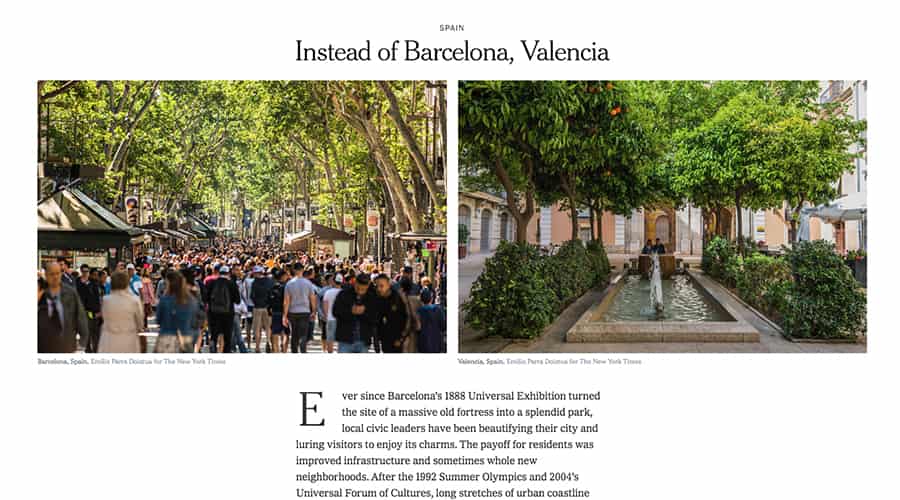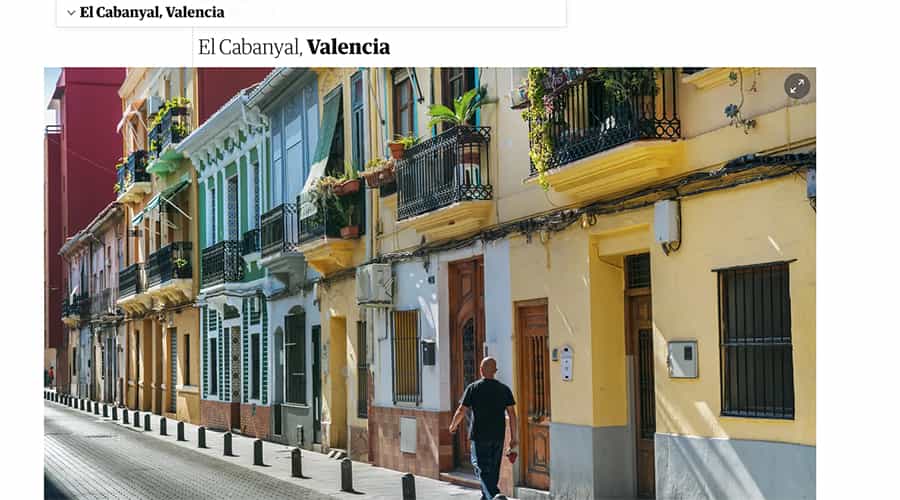It’s been almost ten years since our city attracted the interest of the foreign press for the first time. Today, Valencia is described in the International Media as one of the best places to live on the planet.
For a long time in the shadow of Costa Blanca and Barcelona, as a place to live, enjoy life and generally retire, Valencia began a love affair with the world’s media almost ten years ago. In the midst of the property crisis, in rather bleak and desperate times, major retirement publications began to vote for Valencia as one of the best places to retire. Considering the low price of property and the unusually low cost of services for a European country, Spain has already appeared on many retirement lists, but International Living was the first magazine that declared Valencia to be one of the world’s top spots for retirees.
In 2014, there was another interesting report. After 20 years of research and information gathering, a long study by pharmaceutical giant Lancet declared Spain the healthiest country in the world, with the highest life expectancy and one of the healthiest diets.
That same year, the World Health Organization declared La Comunidad Valenciana to be the area with the healthiest climate in the world. The whole stretch of the Costa Blanca was singled out for its perfect number of sunshine hours throughout the year, but Javea was named the place with the most perfect climate on the planet. As it enjoys a unique microclimate and is protected from harsh winds in winter, it has been considered one of the healthiest places to live in the world.
The greatest place to live abroad
In 2015, the USA Today declared Valencia the Best Bargain City in Europe. “It’s not just the cost of buying a home here that’s a bargain right now. The cost of living in Valencia is one of its greatest attractions. You can see a doctor for as little as 35 euros, rent a beach apartment starting at 350 euros and enjoy a beer in the coastal bar for one euro. A man can have his hair cut (a good measure of the cost of living in a place) in a city centre salon for three euros.” The days of those prices are gone, but this article was probably one of the first to get people in the US interested in moving to Valencia.

Valencia won a “top” position for the first time in the article published in the Huffington Post, in 2016. It was number one on the list of “The greatest places to live abroad” followed by Toronto, Antwerp, and Sydney. The explanation was rather short: “This coastal city is currently experiencing a bump in tourism that tips its hand as a charming place to be. You’ll find cheap rent, great food, and glorious beaches here, too…” However, the article was based on quite serious background research. A combination of three major recent studies contributed to its conclusion: HSBC’s annual Expat Explorer Survey, for which nearly 27,000 respondents rate countries largely on the ease of balancing careers with family life; Eurostat’s Urban Europe Report, which combines statistics with quality of life surveys; and the InterNations´ Expat Insider Survey, which focuses on ease of settlement.
The following year, in another study by Forbes Magazine our city was topping the charts again. This time, Valencia ranked among the best cities in the world for millennials.
Where beaches are not the battlefields…
In 2018, the New York Times declared Valencia to be one of the best places in the world to visit if you want to be “sheltered from the crowd.” It was a very positive article, but with a rather strange title, “Instead Barcelona-Valencia,” and a very funny observation: “For 21st-century Valencians, beaches are not a battlefield but a way of life to be savoured”.
The following words describe well why the New York Times favoured Valencia over Barcelona – “obviously any European city with more than 300 days of sunshine a year, endless beaches, world-class culture, gastronomy, and architecture is never devoid of tourists, but Valencia maintains an under-the-radar vibe and is blissfully free of masses of tourists racing from monument to monument, leaving plastic water bottles and local resentment in their wake.”
Just before the start of pandemic, Valencia was featured prominently in another major newspaper, The Guardian which declared El Cabanyal to be one of the top ten coolest neighbourhoods in Europe, saying: “Over the past few years, El Cabanyal has been on the up, but this authentic slice of the city remains undiscovered by most tourists. While there’s a newly cosmopolitan vibe, the quarter’s traditional personality is being cherished by incomers, and the new shops and bars springing up everywhere tend to respect and adapt the vernacular architecture, rather than replace it.”

Number one for expats
The biggest confirmation of its newfound love with the media, Valencia received at the end of last year, when InterNations declared Valencia the best place to live in the world. The Expat City Ranking Index of InterNations has been used for years as a useful tool not only for expats but also for businesses in general. The number one ranking is expected to give a significant boost to the popularity of Valencia. In this survey, Valencia excelled in the areas of “quality of urban living,” “local cost of living” and the subcategory “health and environment.” InternNations also ranked Valencia high for its local climate and weather and leisure options.
As we began in 2021, another survey put Valencia first. The UK magazine Money has declared Valencia to be the healthiest city in the world and Spain to be the healthiest country in the world. The magazine explains this result with the following quotation: “The people of Spain live by saying, ‘trabajamos para vivir, no vivimos para trabajar,’ which translates as ‘we work to live, and don’t live to work.”
Does anybody read these results and take these surveys seriously? Well, look around you now! At the beginning of the last decade, foreigners were responsible for only about 10% of all property purchases in Valencia, but this number increased to almost 35% just before Covid-19 hit the world. And today we hear mostly French in El Carmen, English in Russafa, and German in the barrio of Jaime Roig. It looks like someone reads these reports, after all.
© Valencia In The International Media- A Ten-Year Long Love Story – TheValencian
Get some more Valencia News
